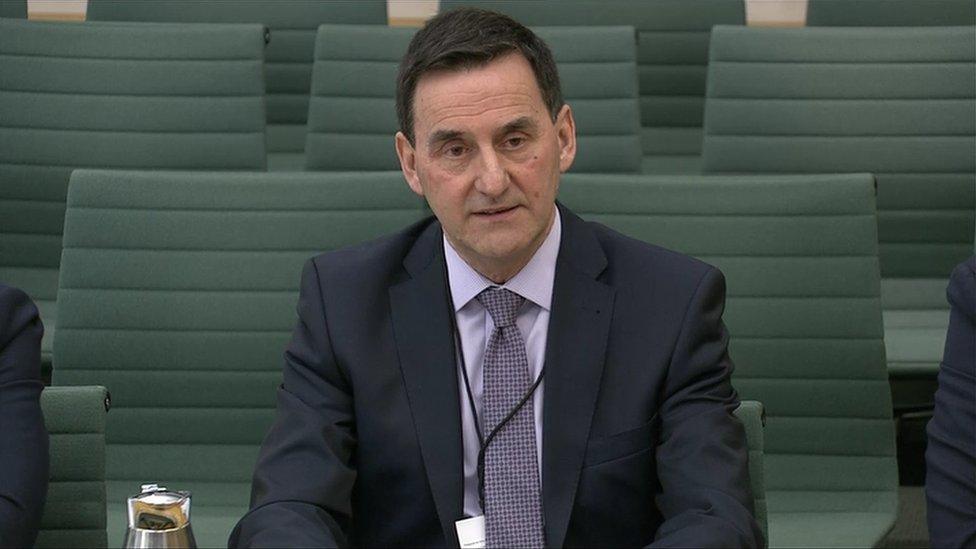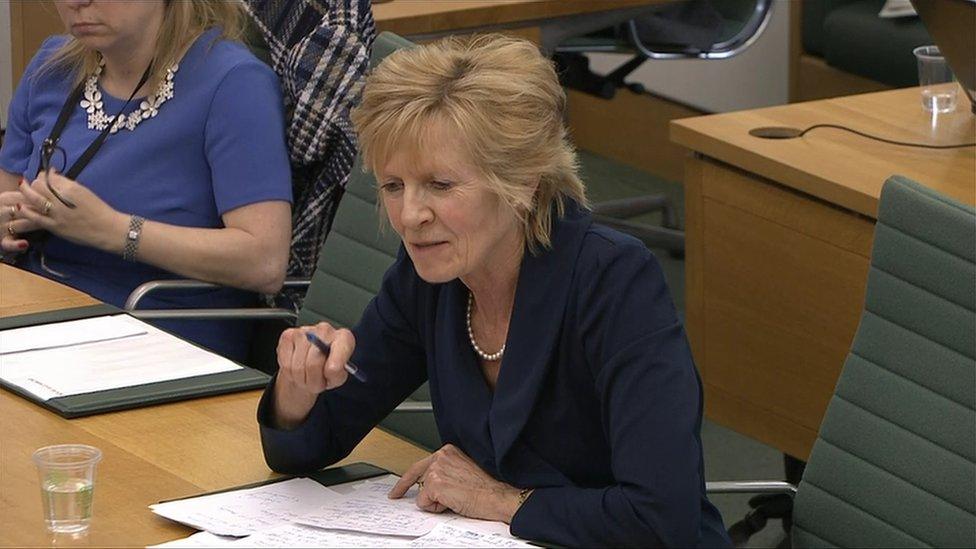'NI schools are not exam factories'
- Published

The Department of Education's permanent secretary said no Stormont is delaying new frameworks
The permanent secretary of the Department of Education said he objects to schools being called exam factories.
Derek Baker made the comments at an NI Affairs committee hearing in response to a question from the DUP MP Ian Paisley.
Mr Baker was responding to claims made by Sir Robert Salisbury at a previous evidence session.
He added that it is "constitutionally and philosophically wrong" that there was no education minister.
"As a civil servant I find it astonishing that in a part of the United Kingdom we have nobody politically in charge of, and democratically accountable for, a service of such fundamental importance to the wellbeing of our society as the education of our children," he said.
Mr Baker mentioned childcare policy as an example of a crucial area which was suffering due to the lack of a minister.
"Childcare strategy is going nowhere in Northern Ireland in the absence of an executive," he said.
"Northern Ireland is falling further and further behind the three other countries in the United Kingdom in terms of our childcare provision as we have no Northern Ireland Office minister or executive to take those kinds of decisions and that is very unfortunate."
In response, Lady Sylvia Hermon MP said the situation was "shocking."
In a wide-ranging evidence session in the ongoing education funding inquiry carried out by the committee Mr Baker addressed a number of issues.
In response to a question from Mr Paisley, he said he disagreed with Sir Robert's comments regarding exam factories.
"I'm aware of comments made at a previous committee hearing about our schools not being exam factories and I don't believe they are exam factories by the way," he said.
"I take objection to that because they are much more than exam factories and we don't do league tables by the way."

Lady Sylvia Hermon MP said the education situation in Northern Ireland was "shocking"
Mr Baker also said that the cost of providing support for children with Special Educational Needs (SEN) had risen to around £270m a year and made up around 40% of the Education Authority's block grant.
"I worry about special educational needs," he said.
"The budget keeps rising as it does in England and other jurisdictions and we need to make sure that we are spending that money in the best way possible."
'We cannot enact regulations'
Mr Baker said the absence of Stormont was delaying the implementation of a new framework for SEN.
"The new framework is, if you like, a three-legged stool," he said.
"We have the primary legislation which has already been enacted by the assembly.
"But that will be supported by more detailed regulations and in turn supported by a statutory code of practice which will set out very clearly the respective responsibilities of all parties.
"We do not have a vehicle for enacting the regulations."

Mr Baker also outlined how the department had spent funding it received from the 'confidence and supply' arrangement between the DUP and the Conservative party.
He said education had received £36.5m in 2018/19 and £16.6m for 2019/20 which would go towards maintaining programmes like Sure Start, nurture units and extended schools funding that otherwise would have faced cuts.
In response to a question from the Conservative MP Maria Caulfield, Mr Baker said that aside from budget pressures resolving the ongoing teachers pay dispute was his main priority.
"Our head teachers in particular are under pressure because of this action short of strike - we need to end this.
"It's one of the biggest risks in my risk register because of the corrosive effect it is having in schools.
"We need to resolve it and I'm determined to try to resolve it."
Describing negotiations as "finely balanced," he said any resolution of the dispute would involve settlements on pay, workload and other terms and conditions.
He also confirmed that the department was in discussions with the Department of Finance and Northern Ireland Office in order to fund a pay settlement above the public sector pay cap of 1%, but did not specify the exact amount sought.
The Northern Ireland Affairs committee of MPs is holding an inquiry into education funding in Northern Ireland.
It will produce a report with recommendations based on the evidence it has received.
- Published9 March 2019

- Published19 November 2018
